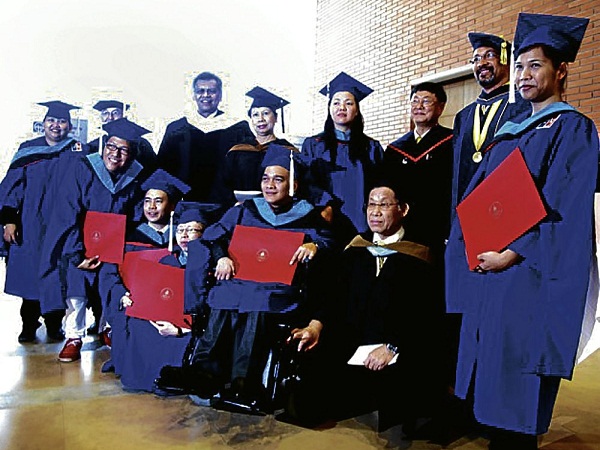
GRADUATES of the American University’s Institute on Disability and Public Policy pose with their professors and Asean secretary general Surin Pitsuwan (third from right). Six of the seven scholars are Filipinos, comprising the first batch of students in the world’s first virtual graduate degree program for people with disability.
BANGKOK—Seven scholars—six from the Philippines and one from Cambodia—graduated with the degree of Master’s in Comparative and International Disability Policy, and made history for being the first batch of students in the world’s first virtual graduate degree program of its kind.
At the graduation rites of the US-based Institute on Disability and Public Policy (IDPP) in Mahidol University in Bangkok, Surin Pitsuwan, Secretary General of the Association of Southeast Asian Nations (Asean), assured last week that the regional body was committed to taking better care of persons with disabilities as the grouping moves towards one community in three years.
The regional organization has endorsed the IDPP—a newly created institute of the American University, which partnered with 13 universities in seven Asean countries with Nippon Foundation as its founder “Asean is aspiring to become a caring and sharing committee of nations,” Surin said.
“The way in which we care for our people, the weak, the disadvantaged, the marginalized, the women, the children, the way in which we treat them, shall be the measure of our own achievement as a community of caring and sharing societies … Asean (has not forgotten ) its commitment to your welfare, to your well-being,” he added.
All over the world, the UN estimates 15 percent or one billion of the world’s population live with disability, 60 million of which reside in Asean.
Dr. Surakit Nathisuwan, vice president for International Relations of Mahidol University, said the IDPP initiative will allow people with disability to integrate across cultures, which will ensure they won’t be left behind when Asean integrates in 2015. “This is at the heart of the Asean message, as we aspire to be one community.”
Asean commitment
In November last year, Asean declared 2011 to 2020 as the Asean Decade for Persons with Disability.
And as not all of Asean’s 10-member countries have ratified the UN Convention on the Rights of Persons with Disabilities, IDPP executive director Derrick Cogburn said the idea behind the program is to produce leaders who could influence public policy and monitor the implementation of the protocol in their countries.
UN data show only the Philippines, Thailand, Laos, Malaysia and Myanmar have ratified the Convention while Brunei, Cambodia, Indonesia and Vietnam have signed it, with Singapore uncertain.
Sociocultural framework
“Asean is the only subregional, intergovernmental body to declare a decade for persons with disability,” said executive director Akiie Ninomiya of the Asia-Pacific Development Centre on Disability, IDPP’s program partner.
Ninomiya said this puts Asean in an ideal spot and it can become a model for subregional collaboration in improving the welfare of people with disability.
“Financially we’re not advanced, but spiritually we are more advanced because family system and community identities are very vital. Asean is very unique in this sense because it focuses on human development under its third pillar on building a sociocultural community,” he said.
Cogburn said this is precisely the reason why American University chose to focus on the region. “The sociocultural community in Asean provided the nice framework for us to think about an education project that will be able to bring together students and faculty from the region to come together.”
Virtual classroom
Crosscultural collaboration is key to making the virtual classroom work, said John Paul Cruz, one of the graduates, in his student address.
“(The) ‘blackboard’ is a virtual room where everybody has a chance to communicate,” he said. “This is very crucial for people with varying degrees of abilities. The good thing and the advantage of blackboard is that it does not impose any bias. In the blackboard there are no prejudices. It embraces diversity and it also embraces the capability of each student.”
Cruz, a freelance policy researcher in the Philippines, has visual impairment. His classmates either have the same disability or hearing or mobility impairment.
Cogburn said the students have “broken the ceiling of physical disability and can become advocates for billions of individuals with disabilities around the world.”
“This program is unique in that it is international in composition—in terms of kinds of students, the partnerships, the institutions involved. This has global potential,” added Fr. Jose Cruz, vice president of University and Global Relations of the Ateneo de Manila University, IDPP’s partner in the Philippines. Asia News Network